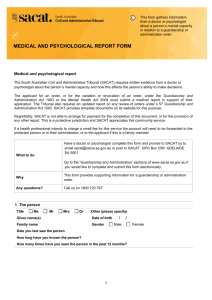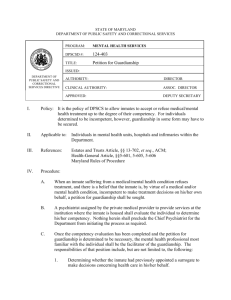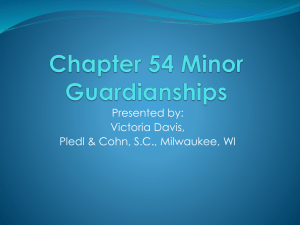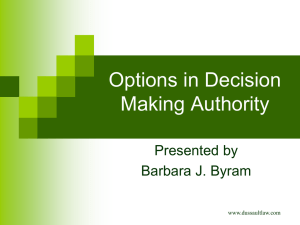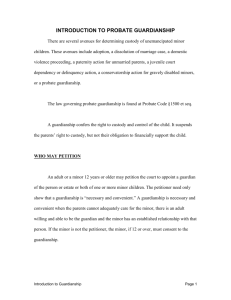Quick Reference to Guardianships and Alternatives
advertisement
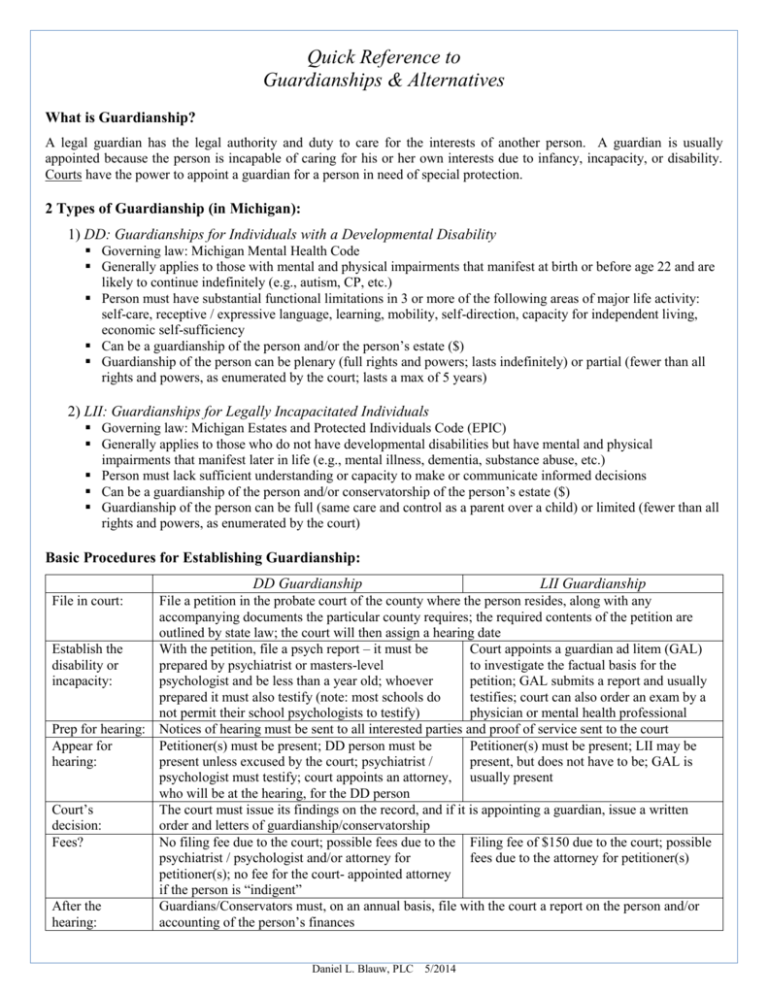
Quick Reference to Guardianships & Alternatives What is Guardianship? A legal guardian has the legal authority and duty to care for the interests of another person. A guardian is usually appointed because the person is incapable of caring for his or her own interests due to infancy, incapacity, or disability. Courts have the power to appoint a guardian for a person in need of special protection. 2 Types of Guardianship (in Michigan): 1) DD: Guardianships for Individuals with a Developmental Disability Governing law: Michigan Mental Health Code Generally applies to those with mental and physical impairments that manifest at birth or before age 22 and are likely to continue indefinitely (e.g., autism, CP, etc.) Person must have substantial functional limitations in 3 or more of the following areas of major life activity: self-care, receptive / expressive language, learning, mobility, self-direction, capacity for independent living, economic self-sufficiency Can be a guardianship of the person and/or the person’s estate ($) Guardianship of the person can be plenary (full rights and powers; lasts indefinitely) or partial (fewer than all rights and powers, as enumerated by the court; lasts a max of 5 years) 2) LII: Guardianships for Legally Incapacitated Individuals Governing law: Michigan Estates and Protected Individuals Code (EPIC) Generally applies to those who do not have developmental disabilities but have mental and physical impairments that manifest later in life (e.g., mental illness, dementia, substance abuse, etc.) Person must lack sufficient understanding or capacity to make or communicate informed decisions Can be a guardianship of the person and/or conservatorship of the person’s estate ($) Guardianship of the person can be full (same care and control as a parent over a child) or limited (fewer than all rights and powers, as enumerated by the court) Basic Procedures for Establishing Guardianship: DD Guardianship LII Guardianship File in court: File a petition in the probate court of the county where the person resides, along with any accompanying documents the particular county requires; the required contents of the petition are outlined by state law; the court will then assign a hearing date Establish the With the petition, file a psych report – it must be Court appoints a guardian ad litem (GAL) disability or prepared by psychiatrist or masters-level to investigate the factual basis for the incapacity: psychologist and be less than a year old; whoever petition; GAL submits a report and usually prepared it must also testify (note: most schools do testifies; court can also order an exam by a not permit their school psychologists to testify) physician or mental health professional Prep for hearing: Notices of hearing must be sent to all interested parties and proof of service sent to the court Appear for Petitioner(s) must be present; DD person must be Petitioner(s) must be present; LII may be hearing: present unless excused by the court; psychiatrist / present, but does not have to be; GAL is psychologist must testify; court appoints an attorney, usually present who will be at the hearing, for the DD person Court’s The court must issue its findings on the record, and if it is appointing a guardian, issue a written decision: order and letters of guardianship/conservatorship Fees? No filing fee due to the court; possible fees due to the Filing fee of $150 due to the court; possible psychiatrist / psychologist and/or attorney for fees due to the attorney for petitioner(s) petitioner(s); no fee for the court- appointed attorney if the person is “indigent” After the Guardians/Conservators must, on an annual basis, file with the court a report on the person and/or hearing: accounting of the person’s finances Daniel L. Blauw, PLC 5/2014 FAQs on Guardianship: Do petitioners have to hire an attorney? Many find it very beneficial to hire an attorney to represent them; others are able to navigate the process on their own and may receive help through the community mental health system. When should petitioners start this process? Absent special circumstances, such as in the case of minors, a few months before the person’s 18th birthday or after. The court hearing cannot be held until the person is at least 18 years old, but prep work can be done a little ahead. Can two people serve as co-guardians? Sometimes the court will permit parents or others to serve as co-guardians. Those co-guardians may serve jointly, or may be given the power to serve “individually or jointly.” The decision whether to permit co-guardians and the extent of their powers is at the discretion of the court. What happens if the court appoints a guardian and then he/she dies or otherwise becomes unable to serve? In DD cases, the petitioner(s) may list a “standby” (back-up) guardian on the petition; that person can then takeover when the guardian becomes unable to serve. If there is no back-up, someone else can petition to become guardian. I have a special needs child and I have always cared for my child. So why do I need a court’s permission to become my child’s guardian, just because he/she is turning 18? In general, when people turn 18, they are “emancipated.” They have a constitutional right to make their own choices. Guardianship proceedings are a mechanism, set up by state law, to enable parents or others to continue making choices for their special needs loved ones. But, keep in mind that any power given to a guardian is correspondingly taken away from the person guarded. So, before a court can appoint a guardian, the law requires that the petitioner(s) establish that the person actually needs a guardian (establish the disability / incapacity), what the scope of the guardianship should be, and that the proposed guardian is fit. If parents choose not to pursue guardianship when their child turns 18, they may legally be precluded from, for example, making medical decisions, signing IEPs, etc., unless an alternative to guardianship is established (see below). Are there alternatives to Guardianship? Yes. Guardianship is not one-size-fits-all. While it may be appropriate or even necessary for many people with a disability or impairment, it is not appropriate or necessary for all. Some general examples of things to think about when determining the need for guardianship, or the scope of guardianship that is most appropriate, are: the person’s ability to make or communicate informed decisions (re: where to live, healthcare, education, socializing, etc.), ability to provide for himself or herself and/or manage finances, limitations in independent living, self-care, and mobility, etc. Some people with a disability or impairment are able to make informed decisions or have meaningful input in decision-making, but still need assistance in a variety of areas, and there are alternatives to guardianship that may be appropriate… Examples of Alternatives: Powers of Attorney (POAs): A POA is a document by which one can give another authority to make decisions on his/her behalf – the other person becomes his/her “agent.” The person signing must be 18 years of age or older and able to form the intent to sign. There is no court involvement; signing is voluntary. Most entities accept powers of attorney, with the exception, generally, of the Social Security Administration. Types: General Durable (can cover finances, signing IEPs, applying for benefits, etc.), Healthcare, Mental Health When does a POA not work well? A POA cannot be used if the person cannot form the requisite intent to sign. Other examples of when they do not work well: If the person frequently desires to “fire” their agent and doing so is not in their best interest; if the person frequently makes decisions, or is swayed by others to make decisions, that are, again, clearly not in their best interest, e.g., signing contracts when they do not understand the obligations entailed, choosing to live in an environment that is unsuitable or unsafe, etc. Social Security Representative Payeeship Trustee over trust funds Social Services / Supports Coordination Natural support from family and friends Daniel L. Blauw, PLC Daniel L. Blauw (616) 336-5098; (616) 459-6792 (fax) danblauw@iserv.net Sarah L. Kirkpatrick (616) 719-0465; (616) 459-6792 (fax) sarah_kirkpatrick@comcast.net Attorneys and Counselors at Law 2020 Raybrook SE, #204A Grand Rapids, MI 49546 www.blauwkirkpatricklaw.com Daniel L. Blauw, PLC 5/2014


